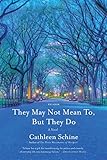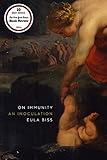Well, I must start and finish this essay while my mother watches my youngest child, my third, but who’s counting? (Dear God, I am!) With writing and motherhood, one is always aware of how little time there is. Writing takes time, and babies don’t give you any of it: particularly breastfed ones; they are like tiny bombs that go off approximately every two hours.
So here we go.
This third child, his name is Mickey Ocean Brown, was born in August. Before and after that I was reading voraciously. I swore off social media for all of 2019, which didn’t so much reveal endless vistas of time and encourage profound thinking, but, rather, showed me that I’m a compulsive reader: I’ve got to be reading something, anything, at all times. I’m like a slobbery Golden Retriever at its dog bowl. More, more, more! At least this year I devoured less Facebook and more, you know, real books.
And I read so many great books!
My fatigue of postapocalyptic novels ended with Severance by Ling Ma. Let me tell you, once you write a novel about the end of the world, you’re asked to blurb many others and also be on every apocalypse-related panel known to humankind. “Enough already!” I felt like shouting, around 2015. But here I am, in 2019, recommending this one. I read Ling Ma’s debut of my own volition (I admit the millennial pink cover drew me in…) and was immediately enthralled by its post-epidemic landscape: an emptied-out New York City, the desolate roads beyond, a repurposed shopping mall. I loved heroine Candace Chen’s pre-apocalypse job as production editor of bibles; I will read the prequel, Ling! I felt Candace’s longing for her mother and boyfriend as if her mournfulness were my own. I loved it.
 This year I discovered two writers who have been around for some time, one so long that she is now dead. That’s Anita Brookner, whom novelist Rumaan Alam recommended in this appreciation. Brookner passed in 2016 but she thankfully left us many novels, which is astonishing when you consider that she didn’t publish her first until she was over 50. I read three Brookners this year, and my favorite was A Closed Eye. Because describing plots is boring, I’ll say that all her work seems to be about a hemmed-in life and a chance for freedom and pleasure that is always, ultimately, denied. Brookner conveys character consciousness with such clarity and depth; she reminds me a bit of Henry James in this regard. However, because her sentences are not nearly as labor-intensive, she can be read poolside and near rambunctious children without a snag.
This year I discovered two writers who have been around for some time, one so long that she is now dead. That’s Anita Brookner, whom novelist Rumaan Alam recommended in this appreciation. Brookner passed in 2016 but she thankfully left us many novels, which is astonishing when you consider that she didn’t publish her first until she was over 50. I read three Brookners this year, and my favorite was A Closed Eye. Because describing plots is boring, I’ll say that all her work seems to be about a hemmed-in life and a chance for freedom and pleasure that is always, ultimately, denied. Brookner conveys character consciousness with such clarity and depth; she reminds me a bit of Henry James in this regard. However, because her sentences are not nearly as labor-intensive, she can be read poolside and near rambunctious children without a snag.

 The other writer I discovered this year is Cathleen Schine. I read They May Not Mean To, But They Do and her newest, The Grammarians. Oh what a delight it is to read Cathleen Schine! Both of these novels are about families and the pain and love and miscommunications and in-jokes and required delusions found therein. Her work is breezy without being stupid, and wise while also being very funny. I keep worrying about the matriarch of They May Not Mean To, But They Do as if she is a real person. What a feat!
The other writer I discovered this year is Cathleen Schine. I read They May Not Mean To, But They Do and her newest, The Grammarians. Oh what a delight it is to read Cathleen Schine! Both of these novels are about families and the pain and love and miscommunications and in-jokes and required delusions found therein. Her work is breezy without being stupid, and wise while also being very funny. I keep worrying about the matriarch of They May Not Mean To, But They Do as if she is a real person. What a feat!
I read a lot of wonderful, thought-provoking nonfiction for my podcast, Mom Rage, including On Immunity: An Inoculation by Eula Biss. I didn’t realize one could tackle the subject of vaccinations from so many vantage points; it makes sense that Biss’s father is a doctor and her mother a poet, for this book’s mix of science and poetry, of the known and ineffable, is a marvel.

 On Immunity is kindred spirits with another book I read for the podcast: Flash Count Diary: Menopause and the Vindication of Natural Life by Darcey Steinke, which also looks at a single subject through many lenses. I recommend everyone read Flash Count Diary, whether you menstruate(d) or not, because there isn’t enough knowledge about (or even acknowledgment of) this big life experience that happens to so many human beings. Steinke’s book is a tapestry of history, science, poetry, scholarly work, and firsthand account. It’s beautiful and raw and brilliant. She writes:
On Immunity is kindred spirits with another book I read for the podcast: Flash Count Diary: Menopause and the Vindication of Natural Life by Darcey Steinke, which also looks at a single subject through many lenses. I recommend everyone read Flash Count Diary, whether you menstruate(d) or not, because there isn’t enough knowledge about (or even acknowledgment of) this big life experience that happens to so many human beings. Steinke’s book is a tapestry of history, science, poetry, scholarly work, and firsthand account. It’s beautiful and raw and brilliant. She writes:
Becoming animal. This does not mean I go feral or become base. It is not complicated. If you pay attention, you can feel animal many times a day: when you fuck, shit, breastfeed your baby, run, swim, eat, or have a hot flash. But I find it hard to sit in the void with my animal self. I want to check my phone every few minutes, to make sure I have enough soy milk for my morning coffee, to see how many people liked the picture I posted on Facebook of my cat.
This spoke to me, in 2019, as I tried not to look at my phone—and often failed. As I pushed a baby through and out of my body and fed him from that same body. As I sat in the void, sometimes with great discomfort.
 And now I’ve got to run upstairs and feed my child. As I do so, I’ll read The Handyman by Carolyn See. Or I’ll close it to look at Mickey. More than books this year, I have read my new child. I have memorized those big blue eyes of his, his funny nostrils, that roll of fat at the back of his neck, his tiny flat thumbnails. Leaving the internet, and having another baby, and reading so much, has made me feel more private and more vulnerable. I feel softer. I feel irrelevant. I feel mysterious. I feel grateful.
And now I’ve got to run upstairs and feed my child. As I do so, I’ll read The Handyman by Carolyn See. Or I’ll close it to look at Mickey. More than books this year, I have read my new child. I have memorized those big blue eyes of his, his funny nostrils, that roll of fat at the back of his neck, his tiny flat thumbnails. Leaving the internet, and having another baby, and reading so much, has made me feel more private and more vulnerable. I feel softer. I feel irrelevant. I feel mysterious. I feel grateful.
More from A Year in Reading 2019
Don’t miss: A Year in Reading 2018, 2017, 2016, 2015, 2014, 2013, 2012, 2011, 2010, 2009, 2008, 2007, 2006, 2005










